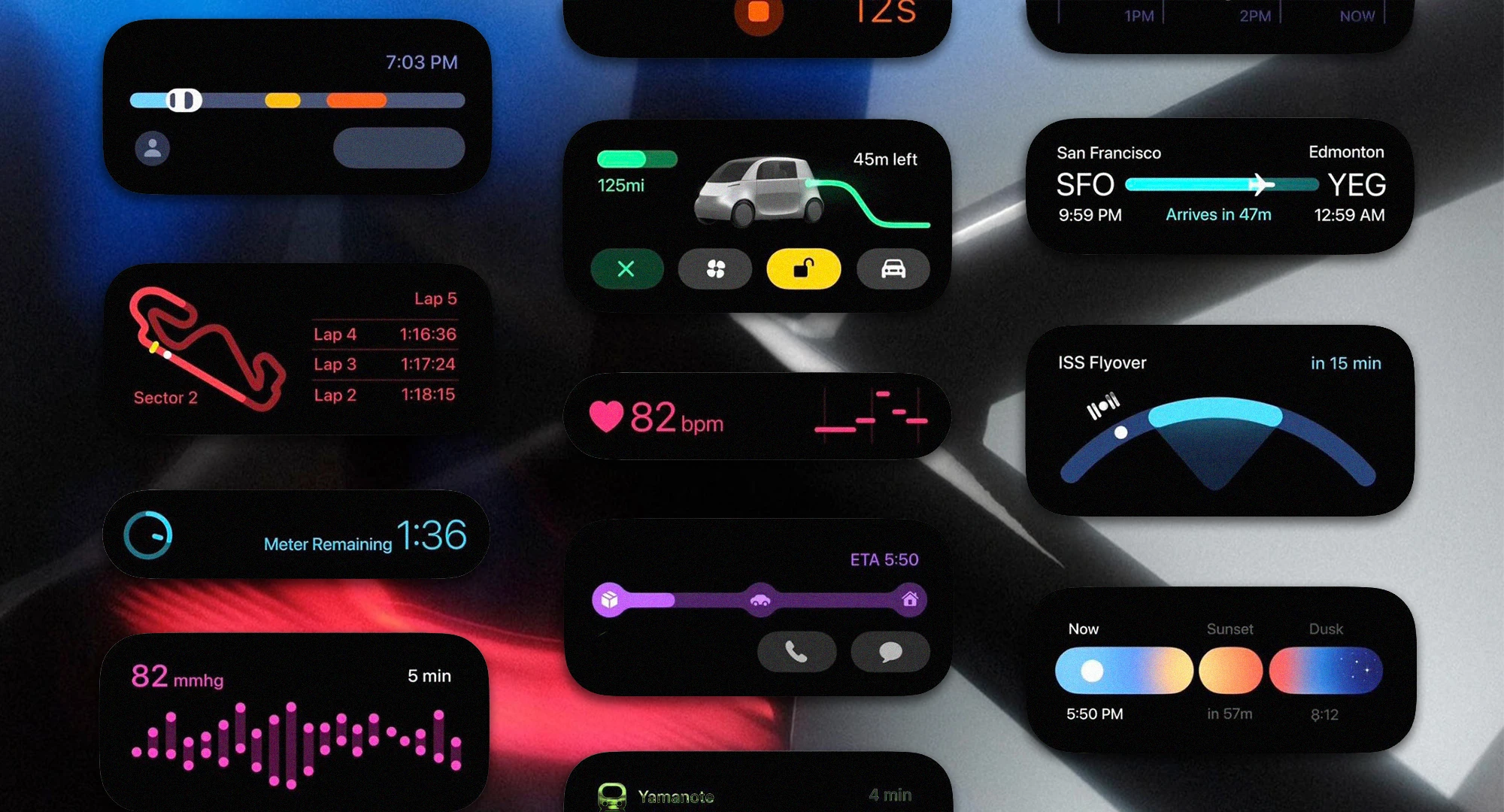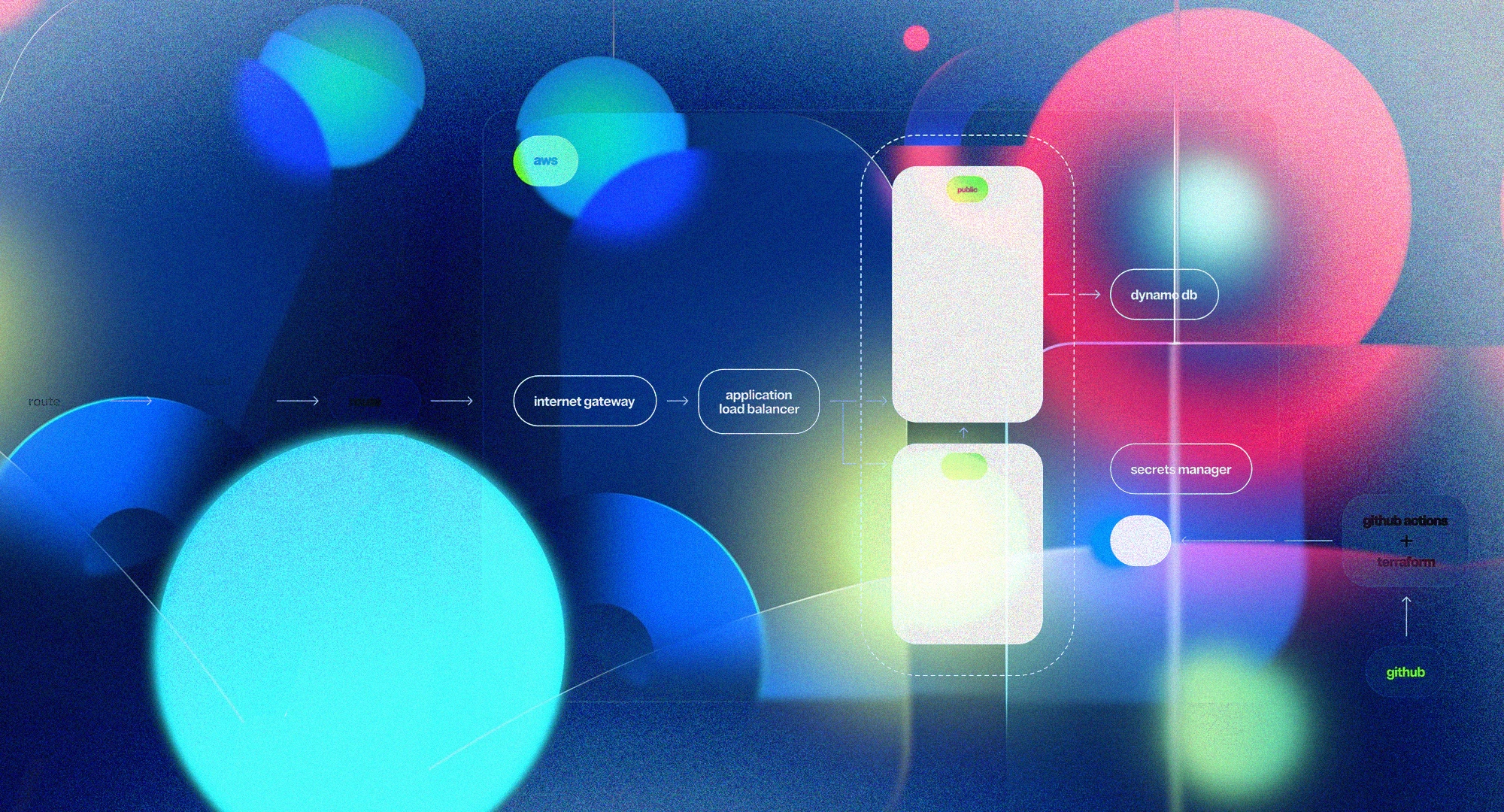
Top Healthcare Web & App Design Agencies to Work With - February 2026
Introduction
Healthcare web and app design has seen major shifts over the past year, with rising patient expectations, new privacy regulations, and rapid tech adoption reshaping how digital experiences are built. In February 2026, choosing the right healthcare web & app design agencies has never been more important.
While many healthcare companies are growing their in-house digital teams, external agencies still offer critical value—bringing specialized expertise, relieving bandwidth pressure, and often lowering long-term costs. Below, we uncover the top 10 healthcare web & app design agencies shaping the future of digital health experiences.
Top 10 Healthcare Web & App Design Agencies
1. G & Co.
G & Co. is a leading healthcare web design agency and consulting partner delivering enterprise-grade healthcare web design services, healthcare app design, and full-scale digital strategy for the world’s top health brands.
G & Co. helps healthcare organizations transform their digital presence through world-class healthcare web design, healthcare app UI design, and omnichannel experiences. As a trusted healthcare web design company, it brings together creative, engineering, and research to deliver intuitive, compliant, and high-performing digital products. G & Co. has partnered with leading pharmaceutical firms, health systems, and life sciences companies to reimagine how patients and professionals engage through digital platforms.
G & Co. is a minority business enterprise (MBE), as certified by the National Minority Supplier Development Council (NMSDC). If diversity inclusion is a part of your supplier process, contact us—we may be a great fit for your enterprise.
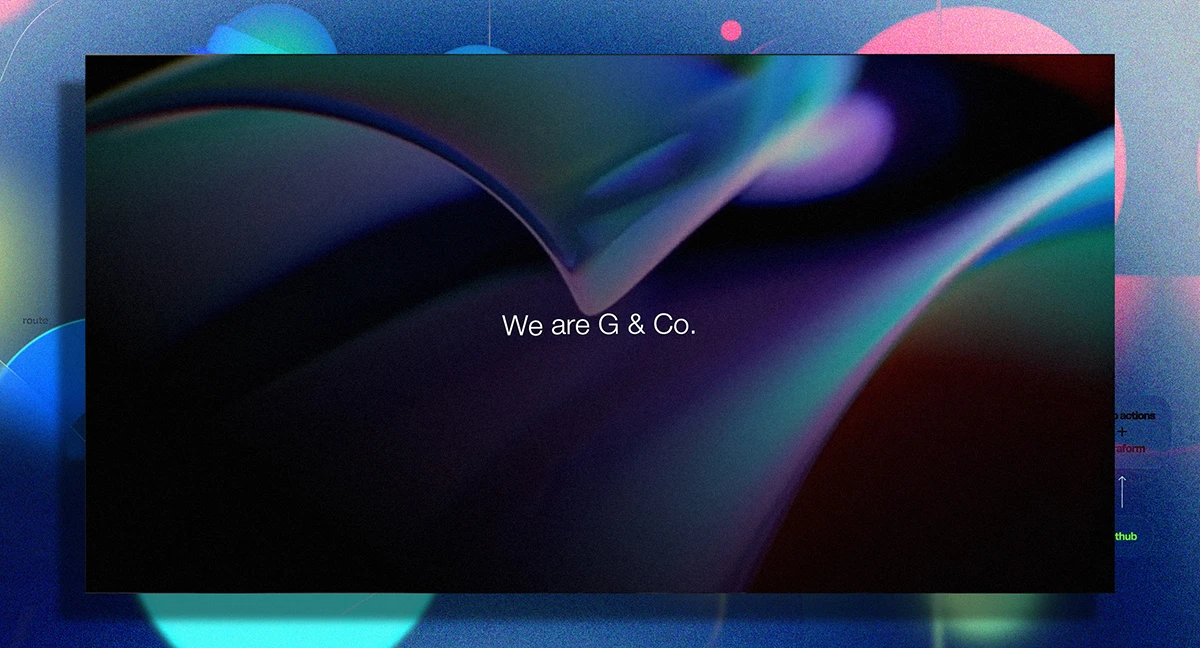
2. Avily
Avily is a healthcare web design company based in South Africa known for building responsive healthcare websites, medical SEO strategies, and healthcare app UI design for providers and clinics.
Their healthcare web design services focus on creating accessible, secure, and regulation-compliant patient experiences. Avily specializes in helping healthcare professionals grow online visibility and streamline user experience through integrated platforms, appointment scheduling systems, and mobile-optimized design.
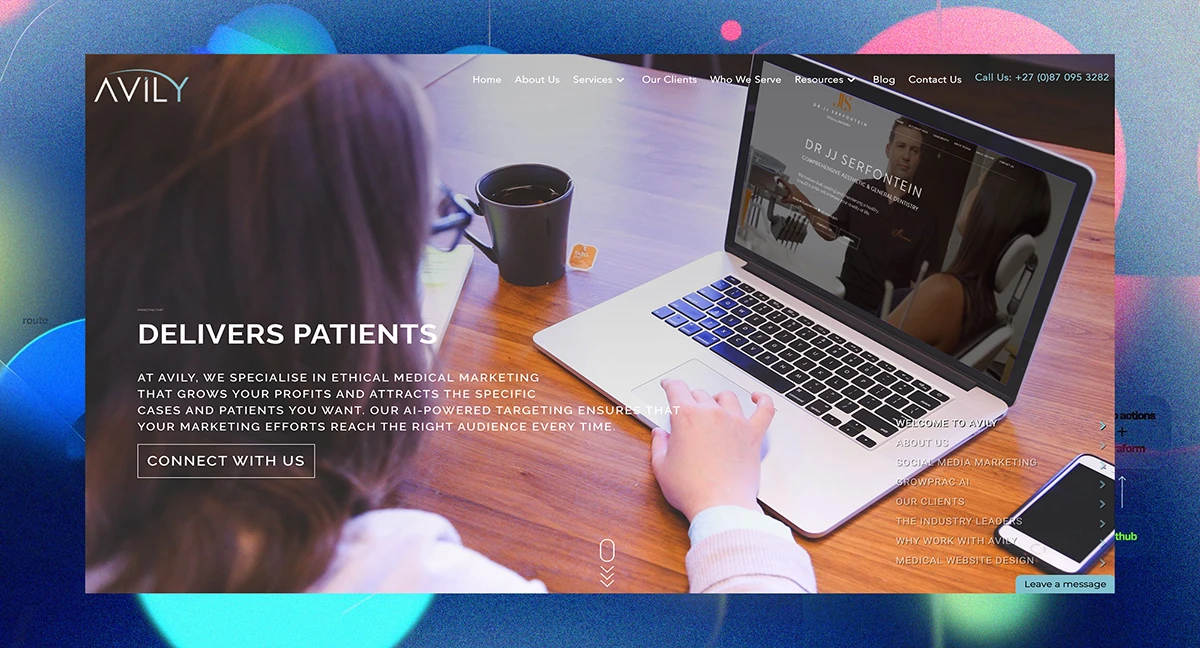
3. Scopic
Scopic is a healthcare web design agency offering custom healthcare app design and development for digital health startups and medical software companies.
Known for its deep expertise in HIPAA compliance and medical data security, Scopic delivers healthcare web design services tailored for remote care, EHR systems, and medical imaging. Their healthcare app UI design emphasizes usability, speed, and integration with existing healthcare platforms.
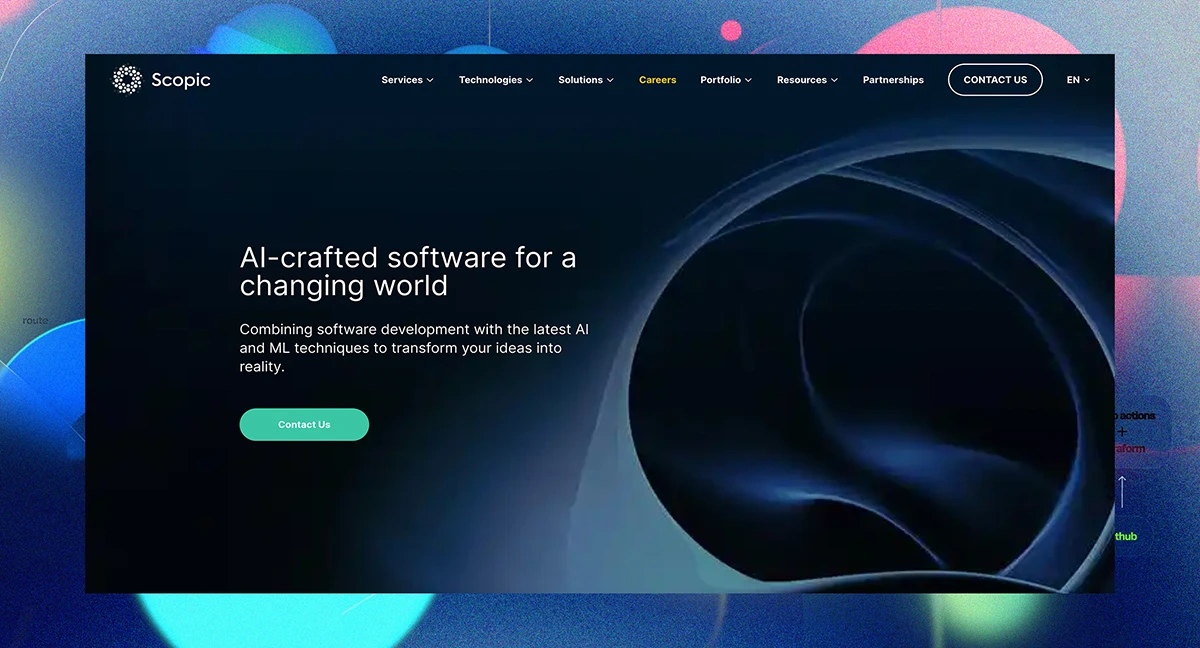
4. Daffodil Software
Daffodil Software is a healthcare web design company providing scalable, HIPAA-compliant digital solutions including healthcare app design and medical portal development.
They offer healthcare web design services with a strong focus on EMR/EHR integration, patient onboarding tools, and mobile health app development. Daffodil supports hospitals and wellness platforms with end-to-end design and engineering teams.
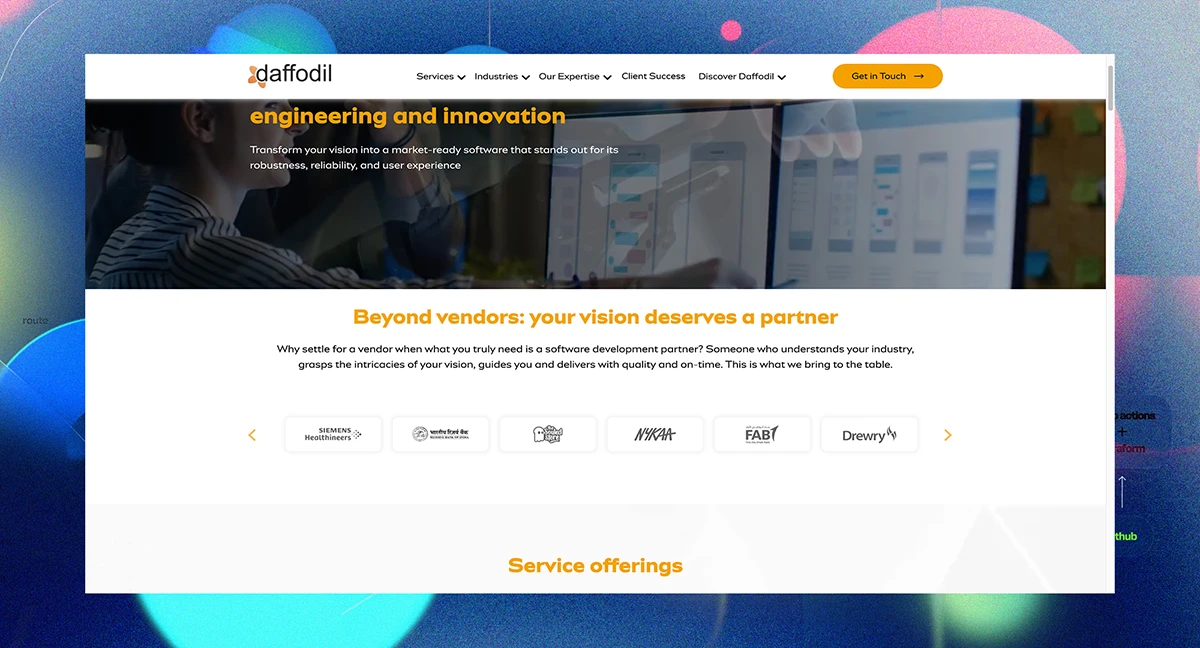
5. BrainStorm Digital
BrainStorm Digital is a healthcare web design agency that helps healthcare brands modernize their digital presence through strategy-led websites and patient-centric app experiences.
Their healthcare web design services include branding, conversion-optimized interfaces, and healthcare app UI design. BrainStorm Digital supports healthcare businesses in building trust with patients while enhancing engagement across digital channels.

6. Naked Development
Naked Development is a healthcare web design company known for its creative-first approach to healthcare app design and user-focused websites.
The agency provides healthcare web design services that combine branding, custom UI/UX, and mobile-optimized development to support healthcare startups and medtech innovators. Their platforms often include real-time communication tools and patient dashboards.
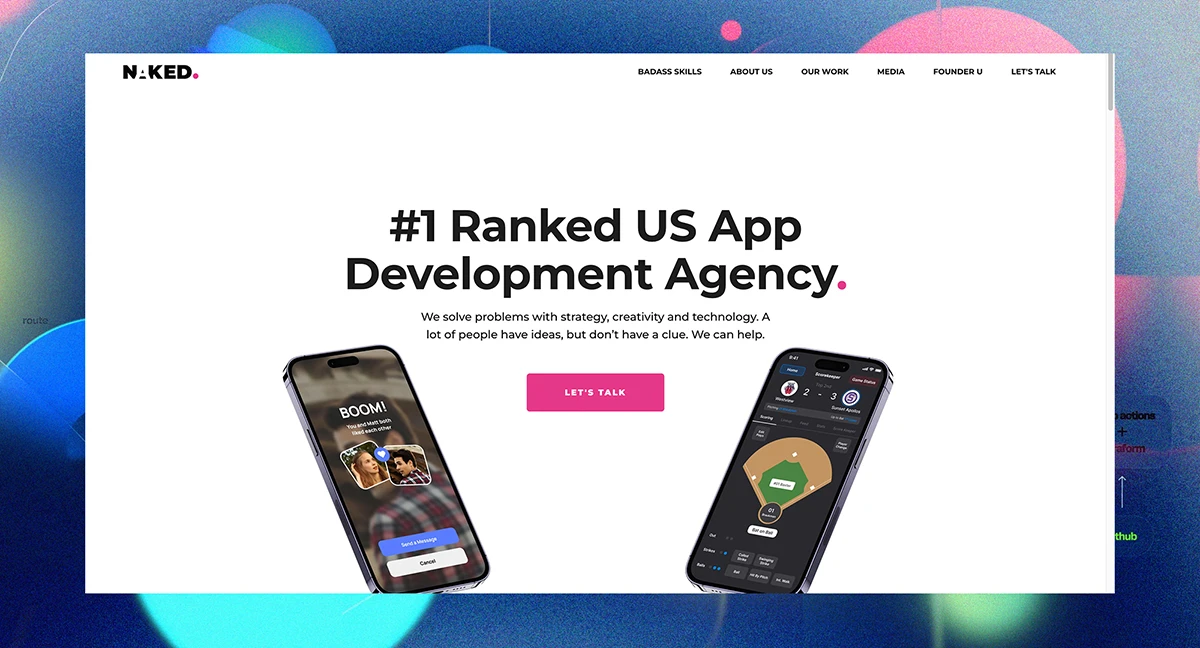
7. Versa Creative
Versa Creative is a healthcare web design agency providing end-to-end digital services including healthcare web design, healthcare app UI design, and marketing strategy for healthcare providers.
They focus on building clean, intuitive sites that align with healthcare regulations and optimize for search visibility and lead generation. Versa Creative’s clients include small practices and regional healthcare systems.
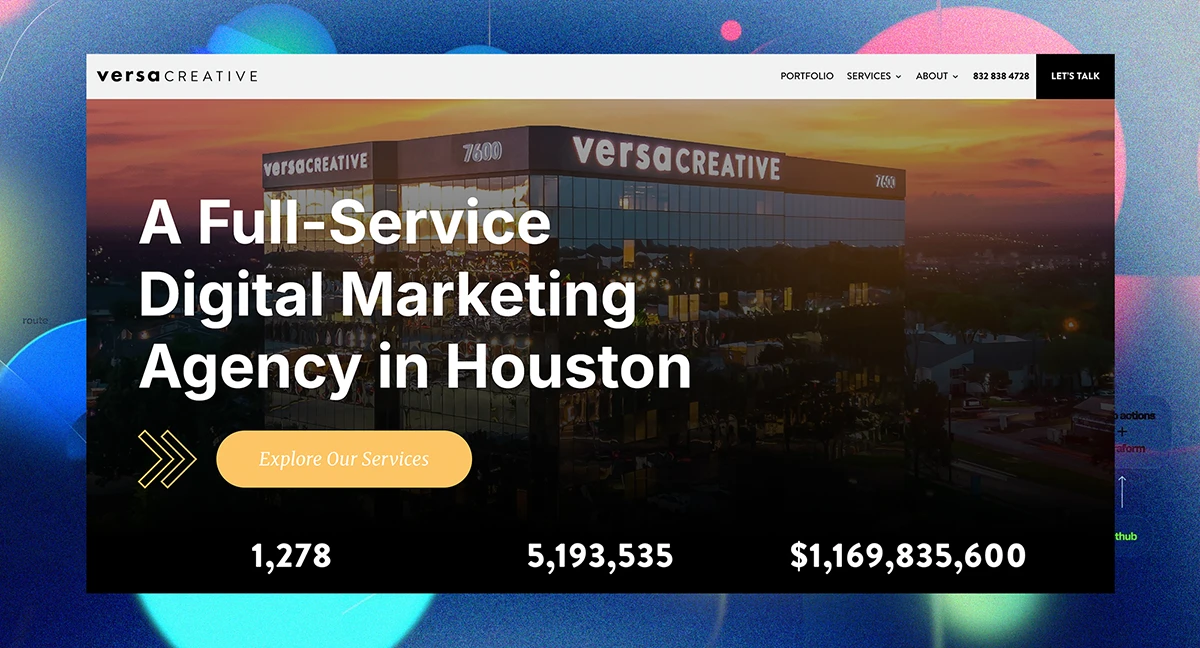
8. O360®
O360® is a healthcare web design company specializing in websites and digital marketing for dentists, physicians, and medical specialists.
Their healthcare web design services include SEO-optimized web pages, integrated scheduling tools, and healthcare app UI design features that prioritize mobile responsiveness and user trust. O360® is built by medical professionals for the medical field.
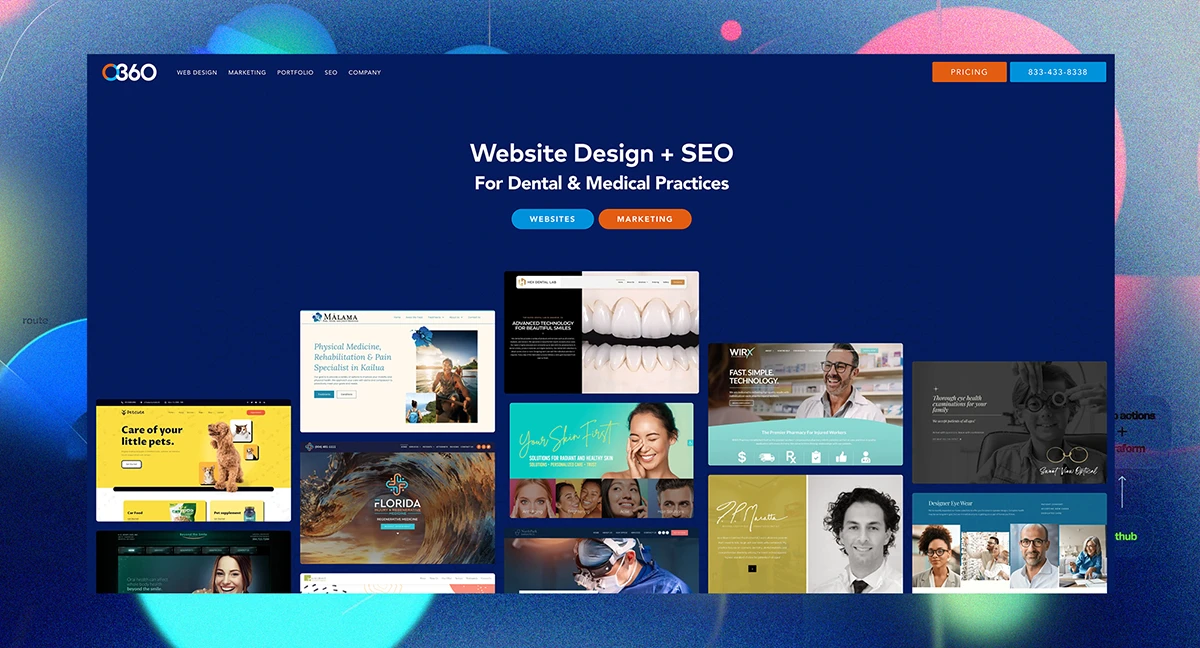
9. Splitpixel
Splitpixel is a UK-based healthcare web design agency offering accessible, inclusive digital design for social care organizations and healthcare nonprofits.
They focus on healthcare web design services that meet WCAG accessibility standards, combined with healthcare app UI design, CMS integrations, and ongoing digital support.
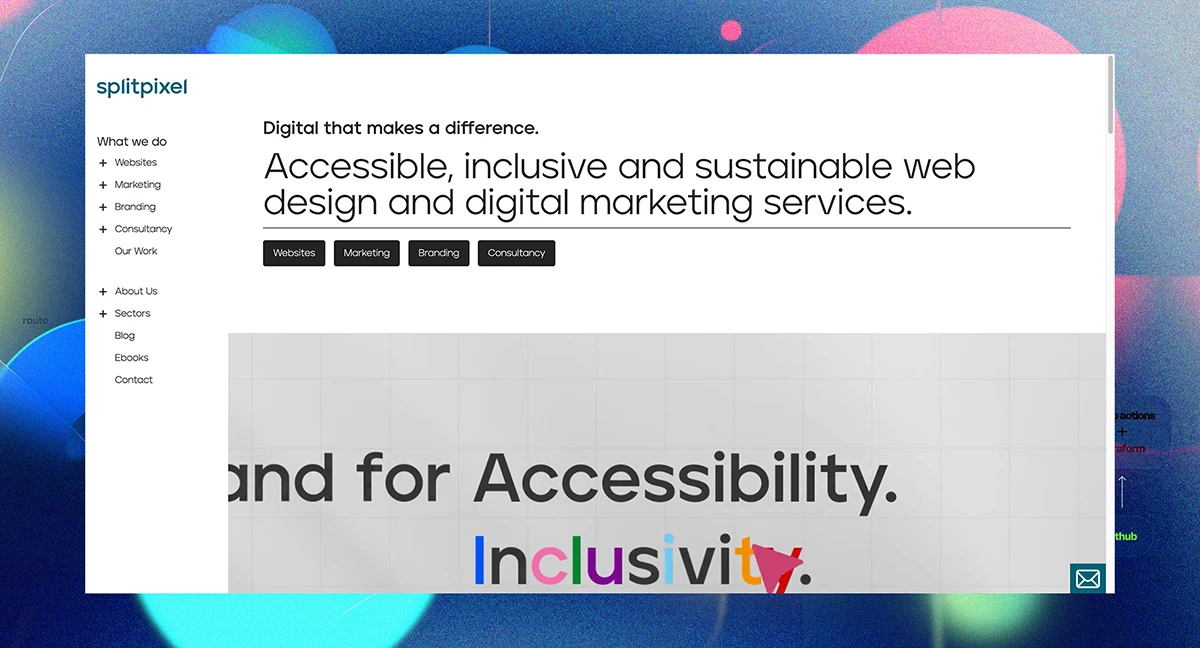
10. SoftTeco
SoftTeco is a healthcare web design company delivering HIPAA-compliant healthcare web design services and healthcare app design for healthtech platforms and care providers.
Their team builds patient portals, secure communication systems, and healthcare app UI design features tailored to modern user expectations in telemedicine, wellness, and diagnostics.
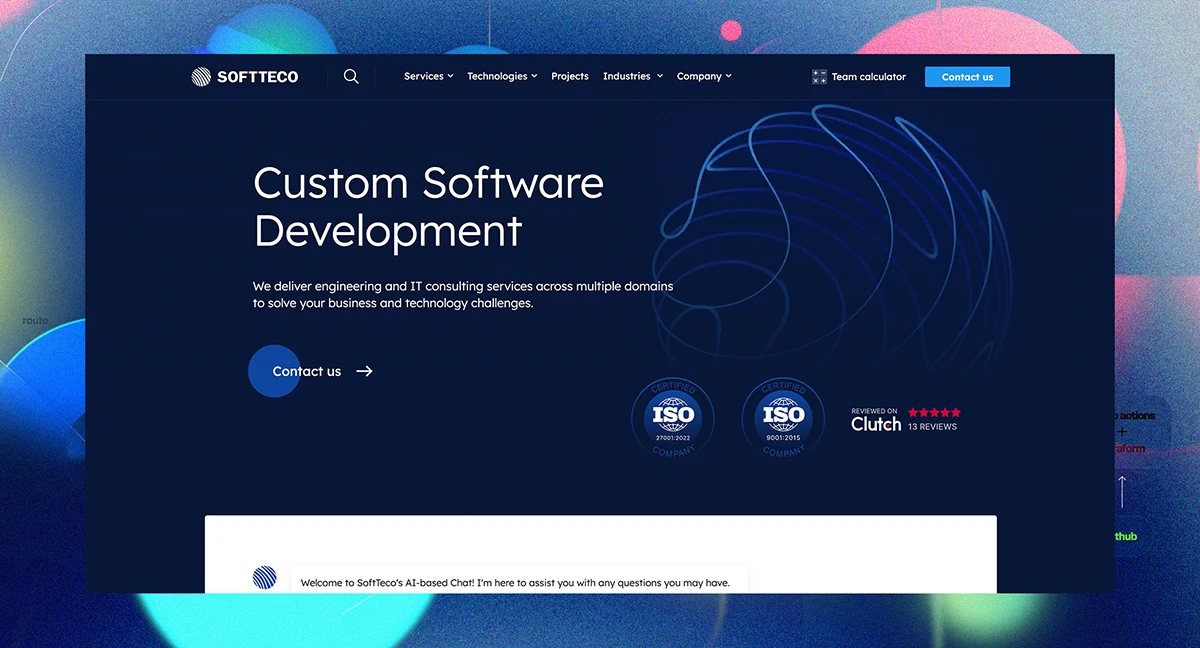
What Is Healthcare Web & App Design?
Healthcare web and app design refers to the strategic planning, user experience (UX) design, and technical development of digital platforms tailored specifically for the healthcare sector, including hospitals, providers, payers, life sciences, and medtech organizations. This discipline encompasses the creation of intuitive, secure, and compliant websites and mobile applications that facilitate patient engagement, streamline clinical workflows, and meet strict regulatory standards such as HIPAA or GDPR. Effective healthcare web and app design prioritizes accessibility, scalability, and interoperability to ensure digital experiences are not only user-friendly but also integrated with backend systems such as electronic health records (EHRs), telehealth platforms, and patient portals.
How Does Healthcare Web & App Design Work?
The healthcare web and app design process begins with research and discovery phases that align user needs with business and clinical objectives, followed by wireframing, UX/UI design, content planning, and technical development within a secure and compliant framework. Each stage is informed by industry regulations, patient privacy laws, and digital accessibility standards to ensure platforms are inclusive and legally sound. Design systems are created to support brand consistency, while development integrates with APIs, EHRs, and third-party tools to enable real-time data exchange, appointment scheduling, and patient-provider communication. Rigorous testing, QA, and post-launch monitoring ensure performance, reliability, and continuous improvement based on user behavior and system analytics.
What Is a Healthcare Web & App Design Agency?
A healthcare web and app design agency is a specialized firm that partners with healthcare organizations to plan, design, and build digital platforms—such as websites, patient portals, and mobile apps—that meet both the functional and regulatory demands of the industry. These agencies possess cross-disciplinary expertise in UX/UI design, healthcare technology, data privacy compliance, and human-centered design tailored to clinical and patient-facing experiences. Their role includes conducting discovery workshops, mapping digital patient journeys, designing secure interfaces, and integrating digital tools with existing health IT infrastructure. Such agencies are critical for enabling healthcare providers to modernize engagement, improve digital access, and differentiate services in a highly competitive and regulated market.
When evaluating a healthcare web & app design agency, it’s essential to understand the breadth and depth of its capabilities. From translating clinical complexity into intuitive user experiences to building HIPAA-compliant platforms that integrate with existing health IT systems, a qualified agency brings both technical execution and strategic insight. The following capabilities highlight how a healthcare web & app design agency can support providers, payers, and healthtech companies in creating digital solutions that improve patient engagement, streamline operations, and meet the evolving demands of modern healthcare.
What Services Do Healthcare Web & App Design Agencies Provide?
UX/UI Design for Healthcare Platforms
A healthcare web & app design agency provides UX/UI design services that prioritize patient usability, accessibility, and clinical efficiency. This involves translating complex healthcare workflows into intuitive interfaces that minimize friction for users such as patients, clinicians, and administrators. Agencies conduct user research, develop wireframes and prototypes, and apply design systems that adhere to both brand identity and regulatory compliance. The result is a seamless digital experience tailored to diverse audiences across the healthcare ecosystem.
Custom Website and Mobile App Development
End-to-end development of custom websites and mobile apps is a core offering, ensuring platforms are built to specification, scale, and compliance. Healthcare web & app design agencies deliver front-end and back-end development services that bring digital products to life—integrating with EHRs, CRM systems, third-party APIs, and telehealth modules. These solutions are developed with performance, security, and interoperability in mind, enabling organizations to meet the demands of both patients and providers in real time.
HIPAA-Compliant Architecture & Development
One of the most critical services a healthcare web & app design agency provides is the creation of HIPAA-compliant digital environments. This includes architecting systems that safeguard protected health information (PHI) through secure hosting, encrypted data transfer, and user authentication protocols. Agencies ensure that every component of the design and development process aligns with HIPAA, GDPR, or other region-specific healthcare regulations—helping clients avoid costly compliance issues while building trust with users.
Patient Portal and Telehealth Integration
Agencies support the development and integration of patient portals and telehealth capabilities, enabling organizations to expand access to care and streamline digital interactions. This includes designing appointment scheduling tools, secure messaging systems, virtual consultation interfaces, and document-sharing modules. These features are integrated into broader digital ecosystems, giving patients and providers real-time access to critical health data and care delivery functions in a centralized, user-friendly platform.
Information Architecture and Content Strategy
To ensure digital products are easy to navigate and communicate clearly with patients, healthcare web & app design agencies offer services in information architecture and content strategy. This involves organizing content into logical structures and creating accessible pathways for users to find what they need—be it medical information, service details, or account management tools. Content is crafted to align with literacy levels, brand tone, and regulatory standards while driving engagement and action.
Accessibility and WCAG Compliance
Inclusive design is a non-negotiable in healthcare, and agencies ensure websites and apps meet accessibility standards such as WCAG 2.1. This includes contrast optimization, keyboard navigation, screen reader compatibility, and alternative text implementation to make digital tools usable by patients with visual, auditory, or cognitive impairments. Agencies regularly audit and test platforms to meet ADA or region-specific accessibility laws, helping clients expand reach and avoid legal exposure.
EHR and Health IT Integration
Healthcare web & app design agencies deliver technical services that connect digital front ends with backend clinical systems like EHRs, LIS, RIS, and more. These integrations allow patient data to flow securely and efficiently between interfaces—supporting tasks such as test result delivery, care coordination, and appointment reminders. Agencies work closely with internal IT and compliance teams to ensure smooth data transfer, proper authorization, and system interoperability.
Ongoing Optimization, Analytics, and Support
Post-launch services are just as critical as the initial build. Agencies provide continuous performance monitoring, A/B testing, user feedback analysis, and iterative updates to improve platform usability and functionality over time. Healthcare organizations benefit from insights into user behavior, content performance, and engagement metrics—allowing data-driven enhancements that keep digital tools aligned with patient expectations and organizational goals.
Let’s kickstart the conversation and design stuff people will love.

How Long Does a Healthcare Web & App Design Engagement Take to Complete?

Understanding the timeline of a healthcare web & app design engagement is essential for aligning internal expectations, resource planning, and launch strategies. While timelines can vary based on project complexity, scope, and integration requirements, most healthcare web & app design agencies follow a structured process that balances speed with precision. This section outlines the typical phases and durations of a healthcare web or app design project—giving stakeholders a clear view of how long it generally takes to move from initial discovery to final deployment.
Project Scope and Complexity
The overall size and complexity of the project is one of the most significant drivers of timeline. A simple marketing website for a private practice may take 8–12 weeks, whereas a multi-module hospital platform with EHR integrations, patient portals, and telehealth functionality could span several months. Prospective clients should clearly define objectives, required features, and user roles early on, as even modest changes to scope can result in delays across the design and development cycle.
Number of Stakeholders and Decision-Makers
The more stakeholders involved in the project, the longer timelines tend to be—especially during feedback and approval stages. Projects that require alignment across departments such as compliance, legal, IT, and clinical leadership often introduce additional review cycles. Clients working with a healthcare web & app design agency should establish a clear decision-making structure and internal lead to reduce bottlenecks and keep progress consistent across phases.
Regulatory and Compliance Requirements
Healthcare web & app design must account for stringent data protection and accessibility regulations, including HIPAA, GDPR, and WCAG. Compliance reviews, legal approvals, and security audits can add time to the process—particularly when PHI is involved. Prospective clients should anticipate these layers and build in time for necessary checks to avoid unexpected delays during pre-launch phases or development handoff.
Technical Integrations and Infrastructure
Integrating with existing health IT systems such as EHRs, CRM platforms, appointment schedulers, or third-party APIs can significantly extend the engagement timeline. Each integration point may require custom development, documentation review, security testing, and collaboration with internal IT teams. Agencies often phase complex integrations over multiple sprints, and clients should expect this portion to take weeks or even months, depending on legacy system architecture and vendor responsiveness.
Content Readiness and Information Architecture
Projects often slow down when clients are not prepared with finalized content, structured data, or clear information hierarchies. Healthcare web & app design agencies typically provide support in content strategy, but delays in content approvals—whether for clinical accuracy, brand alignment, or regulatory review—can push back design and development schedules. Clients should begin content planning early and ensure internal resources are aligned to meet content delivery deadlines.
User Research and Testing Requirements
If a project calls for in-depth user research, usability testing, or accessibility audits, these efforts add time but are essential for delivering a successful digital product. Recruiting users, conducting moderated sessions, and analyzing findings all require planning and iteration. Clients should plan for at least 2–4 weeks for comprehensive testing and be open to incorporating user insights into the roadmap to avoid compromising usability and adoption.
Iteration Cycles and Feedback Loops
Healthcare web & app design engagements are rarely linear, and multiple feedback cycles are often required to refine UI, workflows, or functionality. While iterative design improves outcomes, it also extends timelines if expectations aren’t managed properly. Clients should work with agencies to establish clear feedback windows, milestone approvals, and version control to keep timelines predictable and revisions efficient.
Deployment, QA, and Post-Launch Support
The final phase of deployment, including quality assurance, staging, and go-live readiness, can vary in length depending on the rigor of testing and the deployment environment. Healthcare platforms often require penetration testing, failover planning, and stakeholder training, all of which extend the timeline. Clients should also budget time post-launch for minor fixes, analytics setup, and early-stage optimization, ensuring a smooth transition into active use.
How Healthcare Web & App Design Agencies Price Their Work
Pricing is a critical consideration when engaging a healthcare web & app design agency, as it reflects the complexity, compliance requirements, and level of customization involved in developing digital healthcare solutions. Costs can vary widely depending on project scope, technology integrations, and ongoing support needs. This section provides insight into the key factors that influence pricing models and helps prospective clients understand what to expect when budgeting for healthcare web and app design services.
Project Scope and Complexity
Healthcare web & app design agencies typically base pricing on the overall project scope and complexity, with larger, multi-feature platforms commanding higher fees due to increased design, development, and testing efforts. A simple brochure-style website will cost significantly less than a full-featured patient portal with telehealth and EHR integration. Agencies carefully assess feature requirements, user roles, and content volume during initial scoping to provide accurate pricing that reflects the expected workload.
Regulatory Compliance and Security Requirements
Meeting healthcare regulations such as HIPAA, GDPR, and WCAG introduces additional costs that agencies incorporate into their pricing. These include specialized development for data encryption, secure user authentication, audit trails, and compliance documentation. Agencies also allocate time for security testing and legal reviews, which can increase project costs relative to standard web or app design projects.
Custom Development and Integrations
Projects requiring custom software development or complex integrations with third-party health IT systems generally incur higher charges. Healthcare web & app design agencies price these engagements based on the technical complexity, the number of integration points, and the need for ongoing coordination with external vendors. Custom APIs, real-time data syncing, and interoperability solutions require dedicated resources and extended timelines reflected in pricing.
Design and User Experience Complexity
Pricing also accounts for the level of design sophistication and UX complexity needed to serve diverse healthcare users. Agencies may charge more for tailored UI components, accessibility features, animation, or interactive workflows designed for patients, providers, and administrators. Investments in comprehensive user research and multiple design iterations typically increase costs but lead to superior digital experiences.
Technology Stack and Platform Choice
The choice of underlying technology—such as native mobile apps, cross-platform frameworks, or custom content management systems—affects pricing. Agencies evaluate licensing fees, development environments, hosting requirements, and platform-specific constraints when calculating project costs. Advanced technologies like AI integration or blockchain features generally result in premium pricing.
Project Timeline and Urgency
Compressed timelines or expedited delivery demands can increase project costs due to the need for additional resources or overtime work. Agencies adjust pricing to reflect the intensity of effort required to meet urgent deadlines without compromising quality, security, or compliance.
Ongoing Support and Maintenance
Many healthcare web & app design agencies include pricing options for ongoing support, updates, and maintenance post-launch. These recurring fees cover platform monitoring, security patches, feature enhancements, and user support. Clients can often select tiered service levels based on their operational needs and budget.
Client Collaboration and Communication Needs
The degree of client involvement and communication frequency can influence pricing, especially for projects requiring extensive workshops, stakeholder meetings, or iterative reviews. Agencies factor in time spent on coordination, project management, and governance when pricing engagements to ensure transparent and efficient collaboration throughout the project lifecycle.
Why Hire a Healthcare Web & App Design Agency

Partnering with a specialized healthcare web & app design agency offers unique advantages that go beyond basic digital development. These agencies bring deep industry knowledge, technical expertise, and an understanding of regulatory complexities that are critical to building effective and compliant healthcare platforms. This section explores the key reasons why collaborating with a dedicated healthcare web & app design agency can accelerate innovation, enhance patient engagement, and ensure a successful digital transformation tailored to the healthcare ecosystem.
Specialized Industry Expertise
Healthcare web & app design agencies possess deep knowledge of the healthcare sector, including clinical workflows, patient needs, and industry-specific challenges. This expertise allows them to create digital solutions that resonate with healthcare users and align with complex operational realities, something generalist agencies may struggle to achieve. Their understanding of healthcare terminology, protocols, and user behaviors drives more relevant and effective designs.
Compliance and Regulatory Assurance
Navigating healthcare regulations like HIPAA, GDPR, and accessibility standards is critical to avoid legal risks and protect patient data. Healthcare web & app design agencies bring proven processes and security protocols to ensure digital platforms meet these stringent requirements. Working with an agency reduces compliance burden on internal teams and minimizes the risk of costly violations.
Access to Advanced Technical Skills
These agencies offer specialized technical capabilities in healthcare app UI design, secure development, interoperability, and data management. They stay current with emerging healthcare technologies such as telehealth, AI-powered diagnostics, and blockchain, enabling clients to leverage innovative solutions without building in-house expertise.
Scalability and Flexibility
Healthcare organizations often need digital platforms that can evolve with changing patient needs, regulatory shifts, and technology trends. Agencies provide scalable solutions and flexible architectures designed to grow and adapt over time. This future-proofing reduces the cost and disruption associated with frequent redesigns or platform migrations.
Accelerated Time to Market
By leveraging established workflows, reusable components, and healthcare-specific frameworks, agencies can significantly shorten project timelines. This acceleration enables healthcare providers and organizations to respond quickly to market demands, regulatory changes, or competitive pressures, maintaining a strong digital presence.
User-Centered Design Focus
Healthcare web & app design agencies prioritize patient and provider usability through human-centered design principles, extensive user research, and iterative testing. Their focus on accessibility and intuitive interfaces improves adoption rates, satisfaction, and overall health outcomes, making digital tools more effective and widely accepted.
Integration with Existing Healthcare Systems
Seamless integration with electronic health records (EHR), practice management software, and other clinical systems is essential for operational efficiency. Agencies bring experience working across diverse healthcare IT environments, ensuring that new digital platforms fit smoothly into existing technology ecosystems and workflows.
Ongoing Support and Innovation
Post-launch maintenance, security updates, and feature enhancements are critical in the fast-evolving healthcare sector. Agencies provide continuous support and strategic guidance, helping clients adapt to new challenges and capitalize on emerging digital trends to stay ahead in the competitive healthcare landscape.
How to Choose The Most Reliable Healthcare Web & App Design Agency
Selecting the right healthcare web & app design agency is a crucial decision that can significantly impact the success of a digital healthcare initiative. Given the unique challenges of the healthcare industry—ranging from strict regulatory requirements to complex user needs—choosing a partner with the right expertise, process, and cultural fit is essential. This section outlines key considerations and best practices to help organizations identify and collaborate with an agency that will deliver effective, compliant, and patient-centered digital solutions.
Proven Healthcare Industry Experience
Selecting an agency with a strong track record in healthcare ensures familiarity with clinical workflows, patient behaviors, and healthcare-specific challenges. Agencies experienced in healthcare web & app design understand the nuances of provider and patient needs, which helps create solutions that are both practical and impactful.
Regulatory and Compliance Expertise
Compliance with healthcare regulations such as HIPAA, GDPR, and accessibility standards is non-negotiable. The right agency must demonstrate deep knowledge of these requirements and embed compliance into every phase of design and development to mitigate legal risks and protect sensitive patient data.
Technical Capabilities and Innovation
A capable healthcare web & app design agency stays current with evolving technologies and digital trends. Prospective clients should look for agencies proficient in healthcare app UI design, secure software development, API integrations, and emerging innovations like telehealth or AI, ensuring the solution remains relevant and competitive.
User-Centered Design Approach
Effective healthcare digital tools require a design philosophy centered on patient and provider usability. Agencies that prioritize user research, iterative testing, and accessibility create intuitive, engaging experiences that increase adoption, satisfaction, and overall health outcomes.
Integration and Interoperability Skills
Healthcare organizations depend on seamless data flow across EHRs, patient portals, and clinical systems. Agencies with strong integration expertise can navigate complex health IT environments to deliver cohesive platforms that improve operational efficiency and clinical collaboration.
Transparent Project Management and Communication
Clear, consistent communication and structured project management processes are vital for successful collaborations. Agencies should provide transparent timelines, regular updates, and proactive issue resolution, helping clients maintain control and confidence throughout the project lifecycle.
Scalability and Post-Launch Support
Healthcare digital solutions must evolve with organizational growth and regulatory changes. Agencies offering scalable architectures and ongoing support services enable clients to adapt platforms over time, ensuring longevity and continued alignment with business goals.
Client References and Case Studies
Evaluating an agency’s past work through client references and case studies offers insight into their performance, reliability, and industry expertise. Prospective clients should seek evidence of successful healthcare web & app design projects that demonstrate tangible results and satisfied stakeholders.
15 Questions To Ask Healthcare Web & App Design Agencies Before You Hire One

Before committing to a partnership with a healthcare web & app design agency, prospective clients often have important questions that need clear and thoughtful answers. These questions typically revolve around the agency’s experience, approach to compliance, technical capabilities, and ability to deliver results on time and within budget. This section highlights common inquiries that can help organizations evaluate potential agencies more effectively and make informed decisions that align with their healthcare web and app design goals.
Here are 15 questions a prospective client might ask a healthcare web & app design agency before hiring:
- What experience do you have working specifically with healthcare organizations and digital health projects?
- How do you ensure compliance with healthcare regulations such as HIPAA, GDPR, and accessibility standards?
- Can you describe your process for user research and designing patient-centered digital experiences?
- How do you handle integration with existing health IT systems like EHRs, CRMs, or telehealth platforms?
- What technologies and platforms do you specialize in for healthcare web and app development?
- How do you manage data security and protect sensitive patient information throughout the project?
- Can you provide examples or case studies of healthcare web or app projects you have successfully delivered?
- What is your typical project timeline for a healthcare website or app, and how do you handle delays?
- How do you ensure accessibility compliance for users with disabilities?
- What is your approach to testing, quality assurance, and post-launch support?
- How do you collaborate with internal teams, including compliance, IT, and clinical stakeholders?
- What pricing models do you offer, and how do you handle scope changes or additional requests?
- How do you keep up with emerging healthcare technologies and industry trends?
- What kind of analytics and performance tracking do you implement for healthcare digital products?
- How do you handle training and onboarding for healthcare staff using the new digital tools?
What Experience Do You Have Working Specifically With Healthcare Organizations and Digital Health Projects?
Experience in the healthcare sector is critical due to the industry’s unique challenges, including regulatory compliance, complex workflows, and sensitive patient data. Asking this question helps ensure the agency understands healthcare-specific needs and has a proven track record delivering solutions that align with clinical environments. Agencies familiar with healthcare are better equipped to anticipate industry pitfalls and design products that truly serve patients and providers effectively.
How Do You Ensure Compliance With Healthcare Regulations Such As HIPAA, GDPR, and Accessibility Standards?
Compliance is non-negotiable in healthcare, given the legal and ethical obligations to protect patient data and provide accessible services. Prospective clients should inquire about an agency’s approach to regulatory adherence to confirm they incorporate security protocols, data privacy measures, and accessibility requirements throughout the project lifecycle. This reduces the risk of costly violations and safeguards the trust patients place in digital health solutions.
Can You Describe Your Process For User Research and Designing Patient-Centered Digital Experiences?
Healthcare users range from patients with varying abilities to clinicians with complex workflows. Understanding how an agency conducts user research reveals whether they prioritize human-centered design principles that lead to intuitive, engaging digital products. Agencies that invest in user research and testing are more likely to deliver platforms that improve adoption, satisfaction, and health outcomes.
How Do You Handle Integration With Existing Health IT Systems Like EHRs, CRMs, or Telehealth Platforms?
Seamless integration with existing clinical and administrative systems is essential for operational efficiency and data accuracy. Clients should ask about the agency’s experience connecting with health IT infrastructure to ensure smooth interoperability. This question also helps assess how well the agency manages technical complexity, potential data silos, and vendor collaboration during the integration process.
What Technologies and Platforms Do You Specialize In For Healthcare Web and App Development?
Different projects may require different technology stacks, from native mobile apps to web-based portals or cross-platform solutions. Knowing an agency’s technological expertise helps clients gauge if their tools and platforms align with project goals, future scalability, and maintenance needs. This ensures the delivered solution is robust, secure, and adaptable to evolving healthcare demands.
How Do You Manage Data Security and Protect Sensitive Patient Information Throughout The Project?
Given the sensitivity of healthcare data, it is vital to understand an agency’s security protocols during design, development, and deployment. Clients should inquire about encryption standards, secure coding practices, access controls, and monitoring mechanisms. This question highlights the agency’s commitment to safeguarding PHI and maintaining patient trust.
Can You Provide Examples Or Case Studies Of Healthcare Web Or App Projects You Have Successfully Delivered?
Reviewing past projects allows prospective clients to evaluate the agency’s real-world experience and the quality of their work. Case studies demonstrate how the agency approaches challenges, their ability to meet deadlines and budgets, and their success in achieving client objectives. This evidence provides reassurance of the agency’s competence and fit for specific healthcare needs.
What Is Your Typical Project Timeline For A Healthcare Website Or App, And How Do You Handle Delays?
Understanding expected timelines helps clients plan resources and launch strategies. Projects in healthcare often involve multiple stakeholders and compliance checks, which can impact schedules. Asking about how an agency manages delays and communicates changes is crucial for setting realistic expectations and ensuring transparency throughout the project.
How Do You Ensure Accessibility Compliance For Users With Disabilities?
Accessibility is a legal and ethical requirement in healthcare digital solutions, ensuring all users can access critical services regardless of ability. Inquiring about accessibility practices reveals the agency’s commitment to inclusive design, such as adherence to WCAG standards, and their process for testing and validating accessible features.
What Is Your Approach To Testing, Quality Assurance, And Post-Launch Support?
Thorough testing and quality assurance are essential to delivering reliable healthcare applications that function correctly under all conditions. Understanding an agency’s approach to QA and their plans for ongoing support after launch ensures clients are prepared for maintenance, bug fixes, and future enhancements—critical for long-term platform success.
How Do You Collaborate With Internal Teams, Including Compliance, IT, And Clinical Stakeholders?
Successful healthcare projects require alignment across diverse internal departments. Asking about collaboration processes helps clients assess the agency’s ability to communicate effectively, manage feedback, and incorporate expert insights from compliance officers, IT staff, and clinicians, thereby ensuring the final product meets all operational and regulatory needs.
What Pricing Models Do You Offer, And How Do You Handle Scope Changes Or Additional Requests?
Transparent pricing and flexibility in managing scope changes are vital to avoid budget overruns. This question allows clients to understand whether the agency works on fixed bids, time and materials, or hybrid models, and how they accommodate evolving requirements during the project without compromising quality or timelines.
How Do You Keep Up With Emerging Healthcare Technologies And Industry Trends?
Healthcare technology evolves rapidly, making continuous learning and innovation essential. Agencies that proactively monitor and adopt new trends can provide clients with forward-thinking solutions, competitive advantages, and the ability to leverage cutting-edge tools like AI, telemedicine enhancements, or interoperability standards.
What Kind Of Analytics And Performance Tracking Do You Implement For Healthcare Digital Products?
Data-driven insights are key to measuring success and identifying improvement areas in healthcare digital platforms. Asking about analytics capabilities helps clients understand how the agency monitors user engagement, system performance, and health outcomes, enabling ongoing optimization and evidence-based decision-making.
How Do You Handle Training And Onboarding For Healthcare Staff Using The New Digital Tools?
Effective training and onboarding ensure that healthcare professionals can fully utilize new digital platforms, which is critical for adoption and maximizing value. This question highlights the agency’s approach to developing training materials, conducting sessions, and providing ongoing support tailored to clinical and administrative users’ needs.
Searching For The Right Healthcare Web & App Design Agency?
Hiring a specialized healthcare web & app design agency brings invaluable expertise, industry knowledge, and technical skill that internal teams often lack. Such agencies understand the unique regulatory landscape, patient needs, and clinical workflows essential to crafting compliant, user-friendly digital platforms. Their ability to integrate complex health IT systems, ensure data security, and deliver accessible, scalable solutions accelerates innovation and improves patient engagement. Ultimately, partnering with a dedicated agency reduces risk, enhances efficiency, and drives better health outcomes by creating digital experiences that truly serve both providers and patients.
G & Co. stands out as a leading healthcare web & app design agency by combining deep healthcare industry expertise with a patient-centered design approach and advanced technical capabilities. With a proven track record of delivering HIPAA-compliant, scalable digital platforms integrated seamlessly with EHR and telehealth systems, G & Co. helps healthcare organizations transform their digital presence while meeting stringent regulatory requirements. Their collaborative process, emphasis on accessibility, and commitment to innovation make G & Co. the trusted partner for healthcare providers and life sciences companies aiming to enhance patient experiences and operational efficiency.
Submit an inquiry to G & Co. on our contact page or click on the blue "Click to Contact Us" button on the bottom right corner of your screen for your convenience. We look forward to hearing from you.






%20(1).png)


